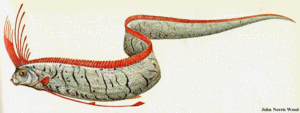 SKC Films Library SKC Films Library |
| |
| SKC Films Library
>> Science
>> Zoology >> Fishes >> Class Actinopterygii |
| Oarfish Regalecus glesne Description One of the largest creatures in the sea, the oarfish has a flattened body that is up to 1 foot deep, but only about 2 inches across, and can be more than 20 feet long; specimens up to 55 feet long have been reported. The metallic silver, scaleless skin is studded with hard knobs and marked with dark streaks and/or spots. The eyes are large. The bright red (or pink) dorsal fin runs the entire length of the body. The first 10-12 rays of the dorsal fin are extra long, creating a type of mane or crest. The tail fin is absent and the pectoral fins are very small, but the pelvic fins are long and slender, broadening at their tips to resemble oars. Distribution and Habitat Oarfish are found worldwide in all tropical and temperate marine waters. Although they have reportedly been seen swimming at or near the surface, it is believed that they spend most of their time at depths between 65 and 660 feet, and possibly as deep as 3,280 feet.. Diet Despite its large size, the oarfish has a small mouth and no teeth. It has instead 42-58 gill-rakers that strain very small crustaceans from the water passing over their gills. Reproduction The eggs are large, measuring .08-.16 inches (2-4 mm) in diameter and containing numerous oil droplets. After spawning is complete, the fertilized eggs are pelagic, remaining at the surface of the ocean until hatching. It is believed that the eggs take up to three weeks to incubate. Oarfish larvae have streamers ornamented with small tags of skin. These streamers are made up of the elongated rays of the dorsal fin and the pelvic fins. What purpose they serve is unknown. Other Information So little is known about oarfish because open ocean sightings of them are uncommon, and underwater sightings are extremely rare. Specimens do wash onto shores fairly often, and live sightings in shallow water have also occurred. Scientific Classification phylum Chordata |
SKC Films Library >> Science >> Zoology >> Fishes >> Class Actinopterygii This page was last updated on February 02, 2017. |
